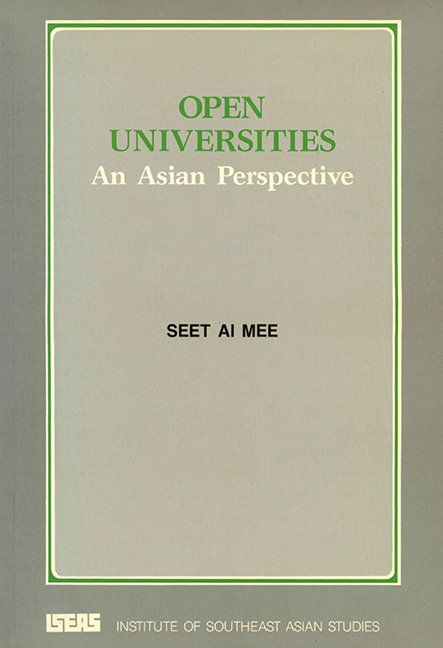Book contents
- Frontmatter
- Contents
- Acknowledgements
- I Introduction
- II Open Universities
- III The Quality of Distance Education
- IV Science and Technology Teaching
- V Continuing Professional Education
- VI Costs of Distance Education
- VII Concluding Remarks
- Notes
- Select Bibliography
- Abbreviations
- Member Institutions of the Association of Asian Open Universities
- THE AUTHOR
IV - Science and Technology Teaching
Published online by Cambridge University Press: 21 October 2015
- Frontmatter
- Contents
- Acknowledgements
- I Introduction
- II Open Universities
- III The Quality of Distance Education
- IV Science and Technology Teaching
- V Continuing Professional Education
- VI Costs of Distance Education
- VII Concluding Remarks
- Notes
- Select Bibliography
- Abbreviations
- Member Institutions of the Association of Asian Open Universities
- THE AUTHOR
Summary
As mentioned earlier, most open universities teach humanities and for a time it was considered difficult to teach science-based subjects through distance learning. This problem was solved by the introduction of Home Science Kits which are used in conjunction with teaching materials for the Sciences. Yet another approach has been to utilize laboratory space available at existing institutions to conduct intensive science practicals. This can be done if the students have travel access to the centres, i.e., in city-based situations.
This is the age of technology. To stay at the cutting edge of education, distance education universities cannot ignore the challenge of teaching technology. Some open universities like the Open University of Israel have developed an electronic teaching kit which is sent on loan to all electrical and electronic engineering students. Others like the UK Open University have worked out inexpensive computer loan schemes for their computer studies students. With available hardware at their finger tips, it has been possible to teach these subjects from the distance. Because of the time-lag between course and equipment development in areas of rapid growth, as in computer science, often the distance learning courses are a little less current than what is available. Nevertheless, this issue can easily be addressed now that open universities have managed to find solutions to the problems of bringing the sciences, engineering skills and computer technology to the student in his own home.
For countries with highly developed communication systems, through use of interactive computer modems, communicating with tutors will be easy and teaching of engineering through computer screens may prove more effective than the conventional lecture techniques.
Distance education is only beginning to look seriously into the teaching of science and technology. This is an exciting area – an area that open universities in Asia should keep abreast of. The future lies in the area of technological advancement and it augurs well for open universities in Asia to start or expand in this area to bring technology education to more people.
- Type
- Chapter
- Information
- Open UniversitiesAn Asian Perspective, pp. 21 - 22Publisher: ISEAS–Yusof Ishak InstitutePrint publication year: 1992



